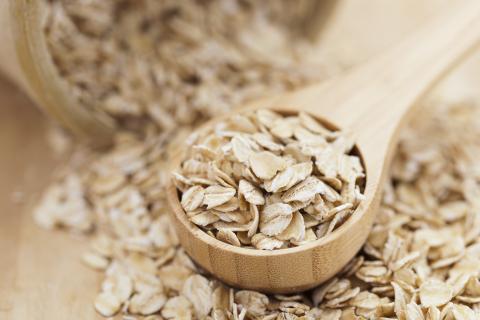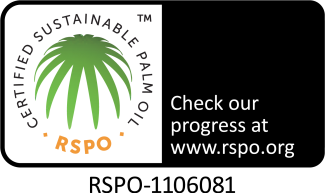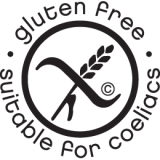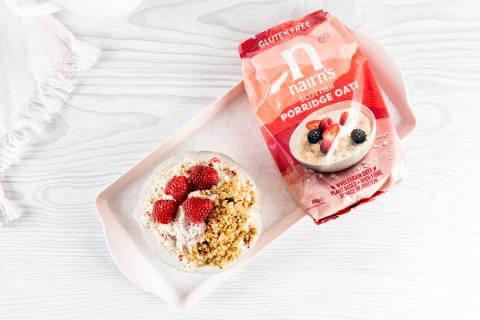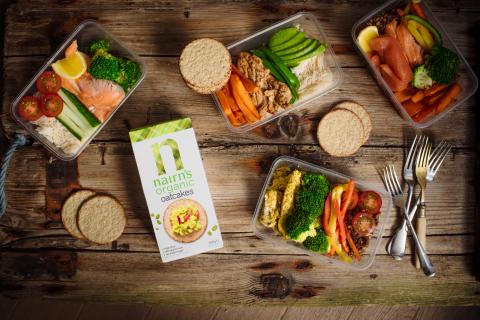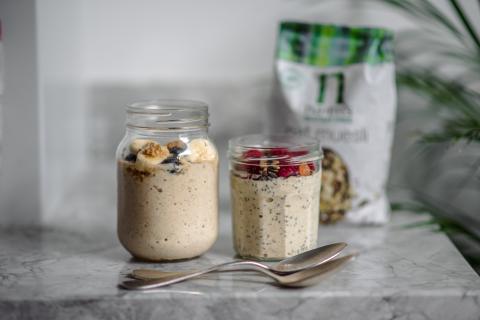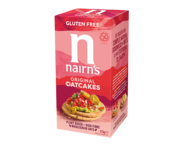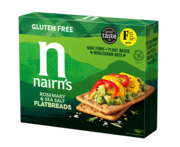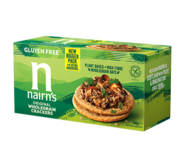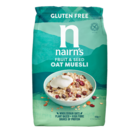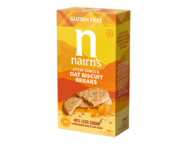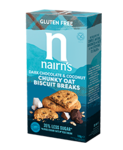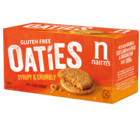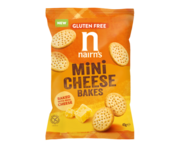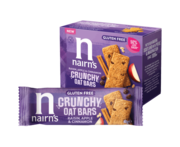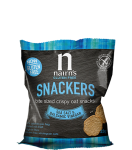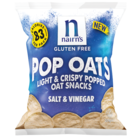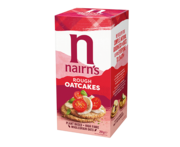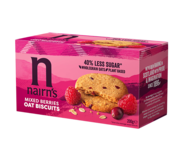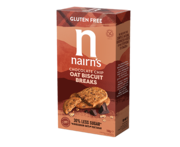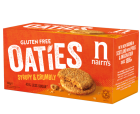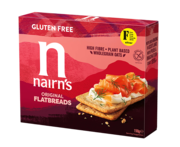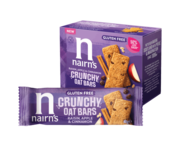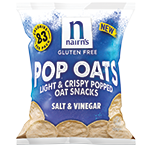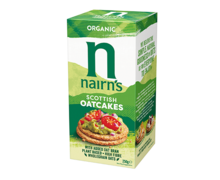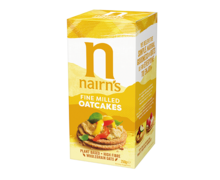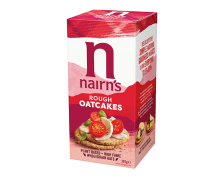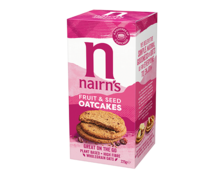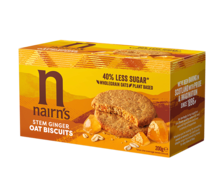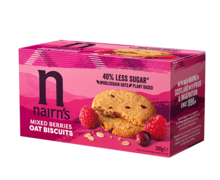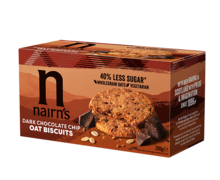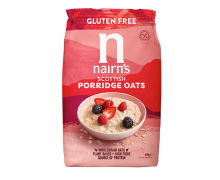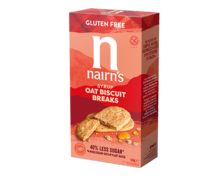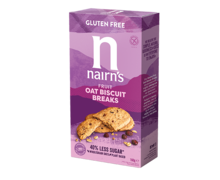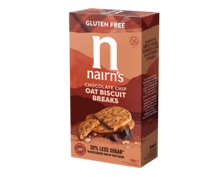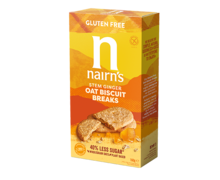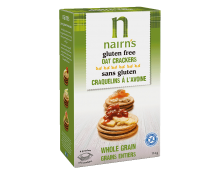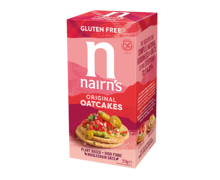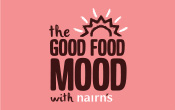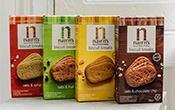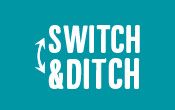All about Oats
Q. Where are your oats produced?
We source the majority of our wholegrain oats from the Scottish Borders, where farmers have been growing oats for generations. We also use gluten free oats from dedicated farmers across the UK who work hard to meet our stringent production criteria. Our oats are milled by John Hogarth’s of Kelso, millers of the finest Scottish oatmeal for over 100 years.
Once the oats have been milled, they are brought to our bakeries in Edinburgh. It’s hard to believe, but our now famous Peffermill site has been making oatcakes and biscuits for the people of Edinburgh since 1935. In 2016, having invested £6.5m, we proudly opened the doors to our new state of the art gluten free bakery to accommodate our expanding gluten free range.
Q. Can I eat porridge oats raw?
Yes absolutely! They can be used in a number of ways but they’re especially good in homemade smoothies or muesli.
Q. Are oats wheat free?
The entire Nairn’s range is made with oats rather than wheat so is great for those who have a known or suspected intolerance to wheat. Eating oats rather than wheat may help relieve the bloating symptoms some people experience after eating wheat.
Q. Are oats a grain?
There are many plant based foods which produce a grain; wheat, rice, oats, corn, barley and rye all included. It’s really what happens next that is important. When these grains are refined and processed, many lose their germ and bran outer coating. Yet it’s here where most of the health benefits lie, which is why at Nairn’s all our oats remain as wholegrains. We want to keep the oats in their simplest, most natural form, because they release the most goodness when they’re left just the way they are. If in doubt, always look for the word wholegrain.
Q. Which vitamins and minerals do oats contain?
Wholegrain oats contain natural vitamins and minerals. Our oats aren’t stripped of their nutrients as part of the refining process. Because they remain unrefined and minimally processed the natural vitamins and minerals such as, manganese**, phosphorus**, magnesium, zinc, iron, folate, vitamin B6 and thiamine are not lost. These nutrients** are known to efficiently transform the carbohydrates in your food into usable energy. Visit our dedicated page to find out more about the benefits of oats.
Q. What are rolled oats?
Rolled oats are oats that have been husked and rolled into flat flakes under heavy rollers. They have often been lightly baked, but not always.
Q. What is your connection to Nairn?
We don’t have any connections to Nairn in the north of Scotland, nor to a celebrity chef of the same name! Our name comes from husband and wife duo John and Sarah Nairn who first started baking their Nairn’s oatcakes in Strathaven (Lanarkshire) in 1896. The bakery later moved to Edinburgh and our range has expanded considerably since those days, but so many of the principles of what we still do now stay true to John and Sarah’s legacy.
Benefits of Oats
Q. What are the main benefits of eating oats?
At Nairn’s we believe in making wholesome products with simple, natural ingredients. That’s why we use only wholegrains in all of our recipes. Wholegrain oats have not been processed into flour, and this brings a number of health benefits for our bodies.
- Wholegrain oats are naturally energising. Because wholegrain oats are not highly processed it takes a while for our digestive system to break down and absorb the carbohydrates. The result – slow release energy which can help fill you up and stop you feeling the peaks and dips of a blood sugar rush. Find out more about the benefits of oats.
- Wholegrain oats contain natural vitamins and minerals. Flours can be stripped of their nutrients as part of the refining process, but this doesn’t happen to the oats in our recipes, which are unrefined and minimally processed. Wholegrain oats naturally contain manganese**, phosphorus**, magnesium, zinc, iron, folate, vitamin B6 and thiamine**. These nutrients** are known to efficiently transform the carbohydrates in your food into usable energy. Keeping our oats in their simple, natural form means these vital nutrients are not lost.
- Wholegrain oats are high in fibre. Oats are an easy and delicious way to add fibre to your day. Eating your recommended daily intake of fibre can help you maintain a healthy digestive system.
- Wholegrain oats are good for your heart. Oats are a rich source of beta-glucans, a rich source of soluble fibre, proven to help reduce cholesterol as part of a healthy, balanced diet. As well as reducing cholesterol, oats can help lower high blood pressure and reduce the risk of cardiovascular disease.
- Wholegrain oats are naturally gluten free. Oats are naturally gluten free, so if you have a wheat allergy or intolerance, then our oatcakes and biscuits make a wholesome alternative to bread and biscuits made with flour. If you are following a strict gluten free diet, for example if you are a diagnosed coeliac, then our dedicated gluten free range is best. Our gluten free range is made under strict conditions where the oats are kept separate and every batch is tested, to ensure that no other grains have slipped into the production process at any point. Find out more about our gluten free range - it tastes so good, you'd never know it was gluten free!
Q. Are oats high in fibre?
It seems that many of us are not getting enough fibre. The recommended daily intake for adults is 30 grams a day, but according to the British Nutrition Foundation, the average intake is only 20.1 grams for men and 17.2 grams for women*. It’s known that a low fibre intake can result in constipation and bring a higher risk of bowel conditions such as diverticulitis and bowel cancer*. So, it’s clear that most of us need to increase our intake! One simple change we can make is switching from bread to oatcakes and oat flatbreads. A typical medium slice of white bread contains around 1 gram of fibre but around 95 calories. One Nairn’s Organic Oatcake contains 1 gram of fibre but only 46 calories – half those in a slice of bread. So, for the same calories as a slice of white bread, you can have two oatcakes and double your intake of fibre.
Switching your snacks to oat-based alternatives could help too. Taking some typical savoury snacks, an average 25g packet of crisps† contains 1.1 grams of fibre, a 22g pack of corn-based crisps†† just 0.4g of fibre, and a 25g pack of wheat-based cheese biscuits contains 0.6g of fibre. But a 23g packet of Nairn’s Cheese Snackers provides 2 grams of fibre, and a packet of Choc Chip Astro Bites contains 1.5 grams of fibre. All this for the same or fewer calories than those typical snacks. So, these are good switches to make, both for adults and children – ideally as part of a healthy diet including plenty of vegetables, fruit, whole grains, beans and legumes.
*Nutrition.org.uk. (2016). Dietary fibre - British Nutrition Foundation -
† Walkers Ready Salted Crisps
†† Monster Munch Roast Beef Snacks
From the British Nutrition Foundation: Recommended daily amounts of fibre:
- Adults and adolescents 16 and over: 30g
- Children aged 11–16: 25g
- Children aged 5–11: 20g
- Children aged 2–5: 15g
Q. How do oats aid concentration?
Oats aid concentration because they break down and release their energy slowly. This helps make sure the brain receives a steady drip-drip of glucose to keep it fed and focused, rather than a peak in glucose followed by a dip. The same goes for preventing a slump in energy after a big lunch. The ‘slump’ can happen because the carbohydrates in your lunch are quickly absorbed then quickly removed from the blood, leaving you feeling suddenly sleepy or in need of a pick-me-up. Swapping your other carbs – such as bread or pasta – for oats can help to keep your blood sugar level steadier and prevent that dip.
Q. Can a healthy intake of oats aid gut health?
Yes, oats are what’s known as a prebiotic, that is they have been found to ‘feed’ the Bifidobacterium – one of the types of healthy bacteria in our gut – and increase their numbers.
Gut health is a hot topic at the moment because we’re learning more and more about how the gut can affect our overall wellbeing. For example, our gut and the microbes that live there are known to influence our immune system, our skin, our brain and mood, and even our body weight. So a gut in poor shape can cause more problems than just bloating or indigestion!
There’s a strong connection between the gut and the immune system mainly because a lot of the tissues that make up our immune system are found in and around the gut wall. By feeding the good bacteria in the gut, oats could help in at least two ways. First, the good bacteria communicate with the immune system cells found in the gut, helping the immune system decide what to react to and what not to react to. Second, the bacteria use oat fibre to produce substances that nourish the gut wall, helping to keep it healthy. This means that the immune tissue there also stays healthy, and helps to stop unwanted substances being absorbed into the body that can cause an immune reaction.
Environmental
Q. What are you doing at Nairn's to be more environmentally aware in your bakeries?
Our production team have worked on a number of initiatives which include the following:
- We purchase 100% Renewable Electricity
- We send no waste to landfill, and have signed up to WRAP
- We have upgraded all our lights to LED
- We continue to focus on improving the efficiency of our production lines and reducing waste
- We are actively seeking alternatives to OPP packaging. We have changed our packaging to recyclable PE and replaced black plastic skillets (where used) with recyclable clear skillets
- We have a cycle to work scheme
- We are working with Zero Waste Scotland on a road map to net zero and are scoping energy reduction projects including voltage optimisation and Solar PV
Q. What is sustainable palm oil? Why can’t you use something else?
We are very aware of the environmental issues surrounding the production of palm oil and we work with the RSPO (Roundtable for Sustainable Palm Oil) to ensure all the palm oil in Nairn's products is sustainably sourced and comes from a segregated supply chain. It’s an important subject that benefits from a thorough explanation, so why not come over to our dedicated page where you can understand our thinking in this area in more detail. Or If you have any general sustainable palm oil enquiries, you can contact the RSPO directly on askRSPO@rspo.org or visit their social media channels. The Worldwide Wildlife Fund have a useful section on their website detailing key things you should know about Palm Oil which can be found here. Nairn's also feature on Act for Wildlife's sustainable palm oil shopping list which has been created to show manufacturers who are committed to using only 100% certified sustainable palm oil in their products.
Nairn’s have recently been recognized for our sustainable palm oil practices and we are now officially included in the World Wildlife Fund’s (WWF) global palm oil scorecard. You can read more about this on our dedicated palm oil page here: https://nairns.com/about-us/sustainable-palm-fruit-oil
Q. Is there a difference between Palm Fruit Oil and Palm Kernel Oil?
Palm fruit oil and palm kernel oil are not one and the same thing.
Palm fruit oil (as used in Nairn’s products), is a non-hydrated oil that is free from trans fats. It is cultivated mostly in Columbia, Malaysia, Thailand, Indonesia and Papua New Guinea and the oil comes from the pressed flesh of the palm fruit. This oil typically contains equal amounts of saturated and unsaturated oils and is rich in micronutrients.
Palm kernel oil, is made from the kernel/seed of the palm fruit. Kernels are taken from the palm fruit clusters and pressed to produce oil. Unlike Palm Fruit oil (which is cholesterol free), Palm kernel oil contains over 80% saturated fats which can have a negative impact on cholesterol levels and heart health.
Q. Is your packaging recyclable? And are you trying to do anything to reduce your plastic packaging?
PLASTIC POUCHES
OPP film, as used by Nairn’s and many other food manufacturers, is recyclable but only where facilities exist. In the UK, there is not yet the extensive kerbside collection and reprocessing infrastructure to support it here. However as of 1st of January 2022, all our clear pouches and printed films (excluding Oat Bars at present) can be recycled at larger supermarkets who offer the facility to recycle carrier bags.
Our packaging team continue explore eco-friendly packaging solutions with our suppliers, and it is vital that any options provide adequate barriers to oxygen and moisture transmission to ensure that shelf life and product quality is not compromised.
OUR CEREALS
In February 2021, we moved to a recyclable alternative for the film used across our cereal range that still gives the barrier to air/moisture that we need. At the moment, the current UK recycling infrastructure means that film like this is recyclable with carrier bags at dedicated points (eg. in supermarkets) rather than at kerbside.
CARTONS & CASES
Our cartons and cases are fully recyclable at kerbside. Our cases are made from a minimum of 75% recyclable materials, with around 90% of our cases made from 100% recycled board.
SNACKERS & POP OATS
Recent changes to specialist instore recycling means that crisp packets and metallised snack and chocolate wrappers can also be recycled. This means you can take our Pop Oats and Snackers packs to selected stores/supermarkets for recycling with carrier bags.
Gluten Free
Q. Are oats gluten free?
Oats are naturally gluten free, so if you have a wheat allergy or intolerance, then our oatcakes and biscuits make a wholesome alternative to bread and biscuits made with flour.
If you are following a strict gluten free diet, for example if you are a diagnosed coeliac, then our dedicated gluten free range is perfect for you. Our gluten free range is made under strict conditions where the oats are kept separate and every batch is rigorously tested to ensure that no other grains have slipped into the production process at any point. There's loads to discover about Nairn's delicious and nutritious gluten free range.
Q. How do you stop your gluten free products from getting contaminated?
Nairn’s gluten free oats are carefully farmed, sourced and milled to ensure they are safe to eat, and baked in our dedicated, state-of-the-art gluten free bakery. Every single batch is tested to ELISA standards, approved by Coeliac UK so you know you can trust the Nairn’s range to be safe and delicious.
Q. Are oats suitable from diagnosis of coeliac disease?
Whilst oats do not contain gluten, they do contain the protein avenin to which about 5% of coeliacs are intolerant. Newly diagnosed coeliacs used to be advised to avoid oats for the first 6 months to 1 year after diagnosis before gradually re-introducing them. This advice has recently changed and the British Society of Gastroenterology Guidelines for the diagnosis and management of coeliac disease advise that gluten-free oats can be included within the diet immediately from the point of diagnosis. If you have any doubts or questions, contact your doctor, dietician or nutritionist.
Q. Why should I include gluten free oats in my gluten free diet?
We think oats make great tasting gluten free food, as they have a delicious natural taste and texture. They can help add more variety to your restricted diet and are clinically proven to provide significant health benefits. They are a rich source of soluble fibre which health experts say helps to fill you up and balance blood sugar levels, making oat based food low GI. They are also a source of insoluble fibre which is essential for healthy digestion. Oats have been proven to reduce cholesterol, help lower high blood pressure and reduce the risk of cardiovascular disease.
Nairn's range of gluten free oatcakes, wholegrain crackers, flatbreads and porridge contain no added sugar whilst our gluten free biscuit breaks and muesli have a lower sugar content than other products on the market. All of this adds up to tasty, natural and wholesome food which can help you to get the most out of your day.
Q. Where can I get Nairn’s gluten free oat porridge? is it available on prescription?
Nairn’s Gluten Free Scottish Porridge Oats (450g) is available widely across the UK - you can find stockists here . A 500g porridge bag used to be available on prescription in certain parts of the UK, but with recent changes to the prescribing of gluten free food, we no longer manufacture this or any other prescription products. Of course, we have a wide range of Gluten Free Nairn’s products available to buy in supermarkets.
Q. I've heard that you don’t make prescription porridge any more, so why can’t you make the standard 450g Nairn’s Scottish Porridge Oats available instead? Aren’t they the same?
A pre-requisite for any food product being prescribed is that it has to be different to a product that is sold in a retail environment. This is why Nairn’s bespoke prescription porridge was a different size (500g vs 450g) and had slightly different graphics on the packaging.
Having assessed the changes to the removal of prescribing foods like porridge in England, Nairn’s and some other companies like us have had to make the unfortunate decision that we cannot commercially make the prescription porridge product work on the Scottish volume alone due to the costs of keeping a bespoke pack based on much smaller volumes. We appreciate that people will be very disappointed by this.
Our standard Nairn’s Gluten Free Scottish Porridge Oats (which are tested to ELISA standards and carry the Coeliac UK Crossgrain Logo) are widely available to purchase in supermarkets, independent health stores and our online shop at RRP £1.99.
Q. I’m newly diagnosed with coeliac disease. When can I introduce gluten free oats into my diet?
This advice has recently changed and the British Society of Gastroenterology Guidelines for the diagnosis and management of coeliac disease advise that gluten free oats can be included within the diet immediately from the point of diagnosis. For more information visit www.coeliac.org.uk or speak to your doctor, dietician or nutritionist.
Q. How do I know if gluten free oats are suitable for me?
Most people with coeliac disease can eat certified gluten free oats with no problems. However, a small percentage of people with coeliac disease (around 5%) may react to a protein found in oats known as avenin. If in doubt speak to your doctor, dietician or nutritionist.
Q. Can I eat as much gluten free oats as I like or is there a maximum amount per day?
Whilst the vast majority of those with coeliac disease can tolerate oats, we would advise you to discuss a question like this with your dietician or nutritionist. Remember that for a healthy diet, variety is the key, so we would recommend including oats in addition to other gluten free grains.
Q. Are gluten free oats suitable for my coeliac child?
Yes, assuming they are not allergic to Avenin, the same recommendations apply to children as they do to adults (see above). As oats are rich in soluble fibre, ensure your child drinks plenty of fluids through the day too.
Q. Are gluten free oats suitable if you are pregnant?
During pregnancy it is important to focus on nourishing your body and ensuring it's absorbing all the key nutrients needed for your health, and the growth and development of your baby. Your doctor will advise you. As coeliac disease is not an allergy but an inherited autoimmune risk, if you are already eating and tolerating gluten free oats there should be no risk. Your doctor may suggest regular antibody assessments are undertaken through your pregnancy. If you have not introduced oats before becoming pregnant it would be important to have an antibody assessment before introducing them and again seek guidance from your healthcare professional as to whether it is appropriate.
Q. Can I just use your gluten free oats for porridge or do you have any other recipes?
Oats are incredibly versatile so in addition to porridge we have created a whole range of delicious, healthy recipes for you to enjoy – all of course gluten free and with a focus on nutritious ingredients to support your health and wellbeing. Try adding our gluten free Scottish Porridge Oats to smoothies, healthy cereal and protein bars, granola, muesli, breads, cakes, muffins and biscuits. You can also use them as a gratin topping over sweet and savoury dishes, crumbles and pancakes. Have a look at our recipe pages for inspiration.
Q: Why are your GF products more expensive than your standard ones?
Gluten Free products are often more costly to produce than standard products because of the amount of additional measures or testing required to ensure their safety for those that need to eat them for medical reasons.
The oats that Nairn’s use in our GF range are more expensive for us to buy because they are much more costly to produce than conventional oats. This is because of the additional control measures required from field to plate to avoid cross contamination of the oats from other ingredients containing gluten such as wheat, barley or rye.
These additional control measures begin with our carefully chosen gluten free oat growers and oat millers. The farms providing gluten free oats to our millers ensure that our gluten free oats are properly segregated at farm, during storage, when transported and when they are milled to ensure that the risk of cross contamination is controlled.
Extensive additional sampling and analysis is required so that each tonne of gluten free oats despatched from the mill is supplied with evidence of the gluten free status of the product provided to us. Additionally for the farmers and millers, a number of control measures such as segregation, additional shutdown periods, deep cleaning, inspection and testing all come at an additional cost to them.
Nairn’s have always had a purpose built bakery for our Gluten free range. Once the oats are delivered to our site, we also conduct additional tests on each batch for gluten. Then, once the finished product has been made, we also do a final test for gluten before the product hits the supermarket shelves. This testing ensures the products can be classified as gluten free and contain less than 20 parts per million of gluten and is carried out by a UKAS accredited laboratory to ELISA standards, the system approved by Coeliac UK.
We have recently bucked the trend, and have passed some of the cost savings of the efficiencies from our new state-of-the-art gluten free bakery onto our consumers. All of our gluten free oatcake and wholegrain cracker packs have been made permanently bigger (33% and 20% respectively) than previously with no increase to the RRP.
Health & Diet
Q. Are Nairn’s products suitable for Vegans or Vegetarians?
In 1978 we took the decision to remove all animal fats from our recipes. With exception of cheese, all Nairn's Oatcakes are Vegan friendly and most of our sweet biscuits are too. Our wholegrain crackers and flatbreads use honey so are not suitable for Vegans. All Nairn's products are suitable for vegetarians. For full nutritional information, please visit our product pages.
Some vegans are keen to know about our production methods as we do bake products which contain milk. Whilst they are made on the same line in our bakery, all equipment has a full and thorough allergen clean-down after production with ingredients that contain milk. We then take a number of swabs to confirm that our allergen clean-down is successful - these swabs are analysed for presence of Casein which would indicate if any traces of milk were still present. This is common and acceptable practise in factories where vegan and non-vegan products are made but still allows the declaration “suitable for vegans”.
It is therefore highly unlikely that any trace of milk (from ingredients such as cheese flavourings for our Cheese Oatcakes) would be present in our other products which do not contain milk as a deliberate ingredient. The status of our factory and the declarations we use on our packaging have been explained to the Vegan Society.
Q. Are your chocolate products vegan?
All of our products that contain chocolate chips are made to a vegan recipe, however the dark chocolate pieces that we use are sourced from a supplier that also handles milk. Due to this we cannot guarantee contamination occurs before they reach our bakery and so we do not declare them as vegan on pack – our supplier also do not declare them as vegan suitable for this reason. This applies to our Dark Chocolate Chip, Dark Chocolate & Mint and Chocolate Orange Oat Biscuits, Chocolate Chip Biscuit Breaks, Chocolate Oaties, Dark Chocolate & Coconut Chunky Biscuit Breaks and Belgian Chocolate Chunk Crunchy Oat Bars, all of which are made to a vegan recipe and contain no animal products in the ingredients.
We are aware products such as this are normally considered as vegan suitable, however we appreciate this is a personal choice.
Q. How does an oatcake compare to bread?
There are three main differences that can make oatcakes a better choice than bread – even wholemeal bread.
- Slow release energy: Perhaps most importantly, oatcakes release their energy more slowly. They’re made with wholegrain oats that have not been processed into flour, and so it takes a while for our digestive system to break down and absorb the carbohydrates. In contrast, most breads and crackers – even those made with wholemeal flour – release their energy relatively quickly because the grains are already almost completely broken down before we consume them – the digestive system has less work to do! So, with oatcakes, you’re more likely to have balanced energy levels throughout the day and better manage your appetite.
- Nothing is lost: The second main benefit is that oatcakes can provide more natural vitamins and minerals – especially compared to white breads. Flours can be stripped of their nutrients as part of the refining process, but this doesn’t happen to the oats in Nairn's oatcakes, which are unrefined and minimally processed.
- No wheat: And thirdly, the fact that they’re made with oats rather than wheat is great for those who have a known or suspected intolerance to wheat (or those choosing to avoid it). They can help relieve symptoms such as bloating that some people may experience after eating wheat.
Q. Are oats good for me?
Oats are a good food to include in our diet. They’re a natural source of vitamins and minerals such as vitamin B1 and magnesium, which – amongst other benefits – are vital for energy. They’re high in soluble fibre, which makes them good for our digestive health too. And oats fibre content also means they release their energy slowly and can help keep us fuller for longer. Visit our benefits of oats section for more useful information.
Q. Are oats high in carbs?
Yes – oats are high in carbs. Around 66% - two thirds – of the calories in oats come from carbohydrates. But they’re slow-releasing carbohydrates so can help give us long-lasting energy. Carbs are not all the same!
Q. Are oats high in protein?
Oats are not generally considered high in protein. Officially, at least 20% of the calories in a food have to be provided by protein for that food to be considered ‘high in protein’. Around 13 to 15% of the calories in oats come from protein. Some of the Nairn’s products are a source of protein (generally those that have added cheese or seeds).
Q. What is dietary fibre/inulin which your ingredient labels show you use on certain Nairn’s products?
Dietary Fibre (Inulin), also known as oligofructose, is a long-chain polysaccharide that is made up of simple carbohydrates. These are important for human nutrition – some can be used as potential sources of energy, whereas others can provide anti-inflammatory and immune modulating properties. The dietary fibre we use is extracted from chicory root (but it is also commonly found in foods such as bananas, leek and onion). Polysaccharide-rich plant foods like chicory root have been used for centuries for their dietary benefits. Chicory Root is a soluble fibre which means it has a prebiotic effect and can help to promote good gut health
Q. Can oats help me to lose weight?
Oats have many health benefits including being a low glycaemic index food and high in soluble fibre. This means they can help you feel fuller for longer, sustaining energy levels and avoiding those energy dips and hunger pangs. So, when combined with a healthy low sugar diet and active lifestyle they may help you lose weight.
Q. I have Type II Diabetes, are oats suitable for me?
One of the benefits of including oats in your diet is that they are a useful source of soluble fibre and slow releasing carbohydrate. They are termed a low glycaemic index (GI) food which means they can help balance your blood sugar levels avoiding sudden highs and lows in glucose levels. This means they can be beneficial in helping glycaemic control in diabetics. Studies also show that beta-glucan (a type of fibre) found in oats has beneficial effects in diabetes. Type 2 diabetes patients were given foods high in oat fibre, oatmeal or oat bran rich foods experienced much lower rises in blood sugar compared to those who were given white rice or bread. Oats are also a rich source of magnesium, a mineral that acts as a co-factor for more than 300 enzymes, including enzymes involved in the body's use of glucose and insulin secretion. Starting out your day with a blood sugar stabilizing food such as oats may make it easier to keep blood sugar levels under control the rest of the day, especially when the rest of your day is also supported with nourishing fibre-rich foods.
Q. What is the % refined sugar in the Nairn's biscuit range?
Nairn’s Biscuits generally contain between 16% and 23% sugar. Other brands of sweet biscuits can contain up to 50% sugar – significantly more! Download the comparison list here for Oat Biscuits and Biscuit Breaks
Q. How can you substantiate that your biscuits have up to 45% less sugar than some of your competitors?
We regularly compare them to over 100 similar everyday premium biscuits, across main category and gluten free. We use this information to show the percentage less sugar vs the average of all those biscuits. We haven't changed the recipes - our sweet biscuits are skillfully made to be naturally lower in sugar AND naturally delicious.... The comparative list for our Oat Biscuits can be downloaded here, and for our Gluten Free Biscuits here.
Recipes
Q. How do you make porridge?
On the hob: Pour half a cup of Nairn's Scottish Porridge Oats into a saucepan. Fill the same cup to the top with your choice of milk or cold water and addd to the oats. Bring to the boil, stirring all the time. Reduce heat to simmer and gently stir for 4-5 minutes.
Microwave: Pour half a cup of Nairn's Scottish Porridge Oats into a deep microwaveable bowl. Fill the same cup to the top with your choice of milk or cold water and add to the oats. Stir well and microwave on either power level 700w for 3 minutes or power level 900w for 2 minutes. Stir half way through cooking.
Q. I know oats are good for me but have no idea what to make with them other than the obvious porridge and flapjacks. Any suggestions?
Yes! Oats are incredibly versatile and there are endless possibilities. For some inspiration in the kitchen, visit our recipe section where you'll find some of our favourites to get you started. Even an oatcake for lunch with a simple delicious topping makes for a nice change, and gets wholegrains into your diet...
Q. How do you make overnight oats?
We thought you might be interested in this, so we've written a fab overnight oats blog where you can find a couple of different recipes. Whether you are looking for gluten free or protein infused oats, we've got you covered, simply find out more here.
Kids
Q. Are oatcakes a good snack for kids?
One thing children need plenty of is energy, whether it’s to engage their brain during lessons, or to answer the familiar cry of ‘I’m hungry!’ and give them a boost before after school activities. What’s brilliant about oatcakes and oat-based biscuits is that they release their energy slowly. It’s easy to see why this might be a good thing as far as physical energy is concerned, but it’s also a welcome boost for a child’s concentration.
The brain receives a steady drip-drip of glucose to keep it fed and focused, rather than a peak in glucose followed by a dip. As an adult you’ll be familiar with the ‘slump’ feeling you can get after a big lunch. This happens because the carbohydrates in your lunch are quickly absorbed then quickly removed from the blood, leaving you feeling suddenly sleepy or in need of a pick-me-up. Swapping other carbs – such as crisps or flour-based biscuits – for oats can help to keep your child’s blood sugar level steadier and prevent that dip.
And because we only use wholegrain oats in our recipes you’ll find Nairn’s products naturally contain essential vitamins and minerals too such as iron, Vitamin B6, and zinc.
So, if you’re looking for a clever way to add some wholegrains to your child’s diet, oatcakes and our oat biscuits are an easy place to start. We regularly hear that children love our cheese oatcakes just on their own (a great snack for the car or when you're out and about...) and fine milled oatcakes with hummus and sticks of freshly chopped veggies are always a winner.
A welcome boost for any schoolbag
- Full of natural energy
- Simple honest ingredients
- Nothing artificial
- On-the-go snack packs
- Slow release energy aids concentration
- Give their lunchbox a wholesome side.
If you can't find the answer to your question above, drop an email to info@nairns-oatcakes.com and one of our super-helpful team will get back to you as soon as they can.

